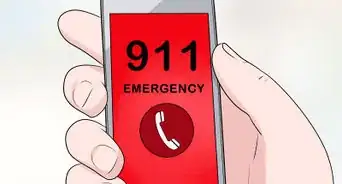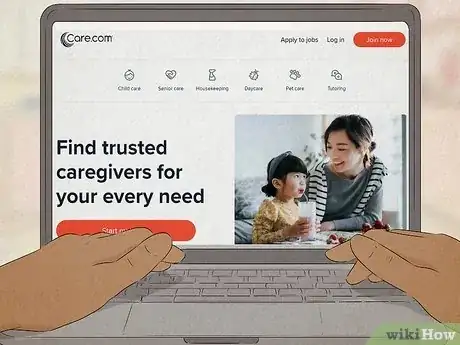This article was co-authored by Lauren Chan Lee, MBA and by wikiHow staff writer, Luke Smith, MFA. Lauren Chan Lee is Senior Director of Product Management at Care.com, the largest online marketplace for finding and managing family care. She has worked in product management for over 10 years across a variety of specialties and areas. She received her MBA from Northwestern University in 2009.
This article has been viewed 3,547 times.
It’s tough to be away from your kids, especially when you’re worried about who’s watching them. Grandpa tends to snooze when he’s supposed to be keeping an eye on the tykes, and your sister doesn’t quite “get” children. How do you find someone you can trust? Someone who’ll stay alert and get the kiddos to bed on time? We’ve put together 13 tips on how to find a sitter, how to make sure they’ll do the job right, and how to prepare them for your time away. So take a deep breath—we’ll get you out on the town with some peace of mind.
Things You Should Know
- Ask your neighbors, coworkers, or place of worship for recommendations on trusted local babysitters.
- Use an online babysitter directory like Care.com or UrbanSitter to browse a larger pool of sitters.
- Run a background check and have an interview with any potential babysitters to make sure they’re trustworthy and are a good fit.
- Brief your babysitter on house rules, emergency contacts, and special needs to make sure they’re as prepared as possible to watch your kids.
Steps
Ask around your community.
-
Ask your neighbors, coworkers, or church for sitter recommendations. Chances are, there are already a number of reliable sitters working for people you trust. Asking people in your circle about available sitters is a great way to find someone that has already built trust in your community.[1] X Research source
Ask your daycare or pediatrician.
-
Childcare facilities usually have a list of trusted sitters. This includes places like children’s hospitals or after-school programs, which tend to have good connections to related services like babysitters. Ask a staff member or representative if they have a childcare directory or even personal recommendations for babysitters.[2] X Research source
Hire a student.
-
Junior high and high school students usually have workable schedules. They’re in school all day, but then are often looking for a side gig in the evening, and babysitting is a go-to hustle for many. If you have a child in school, or friends who have kids in school, ask if they know anyone trustworthy looking for a little cash. Just know that if you hire a student, they’ll also probably be doing homework while they watch your child.[3] X Research source
- Students are typically less experienced than other babysitters and might lack certain training. Because of this, they’re typically better suited for watching older, more independent children.
Use an online sitter directory or app.
-
Consult an online resource to view available sitters and their reviews. Services like Care.com, Sittercity, and UrbanSitter exist to make your life as a parent easier. These websites act as matchmaking services for parents and babysitters, and you can browse from a list of available sitters and read what other parents have said about each of them.[4] X Research source
- Interview and interact with a sitter from on online service before you hire them, even if they have positive reviews.
Do a background check.
-
Look into your sitter’s history, even if they come recommended. Once you’ve established contact with a sitter, ask them if you can run their name through a background check. Most will agree to the process (and if they don’t, that’s a red flag!). Services like Care.com offer checks on criminal and motor vehicle history.
- You can also request a background check from your local government’s criminal justice department. This process varies by jurisdiction, so contact a staffer at the criminal justice office for details.
Ask about their medical certification and emergency training.
-
A babysitter should know CPR and what to do in other crises. It’s important to have a sitter that knows how to handle kids in every situation, even the scary ones. They don’t need to be a registered nurse, but they should be able to do things like administer medication, perform CPR on a child, and drive.[5] X Research source
- Also ask if they’ve completed any babysitting certification programs, like the American Red Cross Babysitter’s Training. It’s not necessarily required, but experience like this can offer peace of mind.
Conduct an interview with the sitter.
-
Before you hire someone, ask them about themselves. Questions like “How long have you been babysitting?” or “What ages do you usually sit?” can give you a decent read on a sitter’s experience and comfort level. Don’t just stick to business, though; a casual conversation about both your interests and personal lives can tell you a lot about if a sitter is a good fit for you and your children.[6] X Research source
- Also ask things like, “Do you smoke?” “How do you handle a crying child?” “Are you vaccinated?” “How do you like to entertain kids?”
Do a trial run.
-
Have your potential sitter watch your kids with you present. It’s important to know they’re capable, but it’s also important to know that they get along with your kids. A sitter who’s incompatible with your children will have a harder time sitting, and might not do as good a job as one who is. Watch especially for if their “parenting” style is similar to yours, or otherwise acceptable to you.[7] X Research source
- Let the potential sitter play with your child, and observe how they participate. Are they enthusiastic? Do they maintain healthy boundaries? Watch to see if they’re engaged and thoughtful in how they interact with your child.
Discuss payment upfront.
-
Ask how much it will cost before you schedule a sit. Different sitters charge different rates, and you don’t want to come home to a bill that dampens your otherwise enjoyable night out. Likewise, they don’t want you to shortchange them. Be clear about how much you can pay, and don’t be afraid to do a little bargaining, if need be.[8] X Research source
- The average sitter’s rate in the U.S. is about $20.50 for a single child, and $23.25 for two kids. This isn’t a hard-and-fast number, but expect to pay about that much.[9] X Research source
Go over house rules.
-
Let your babysitter know how you run your home. Your babysitter is acting sort of like a temporary parent, and you don’t want them undermining the home life you’ve established. Specify things like bedtimes, diet, your children's responsibilities, limits on electronics, and general house rules.[10] X Research source
- Write these down on physical paper, as well, so your sitter always has access to what’s expected of them.
Clarify emergency protocols and contacts.
-
Acquaint your sitter with things like first-aid kits and security systems. Make sure your sitter knows where your child’s medication is kept and how to administer it, as well as who to call in an emergency (your cell, a partner’s cell, poison control, etc.). Also, review emergency exits and things like smoke detectors and fire extinguishers.[11] X Research source
- Also review general safety rules, like your child’s allergies, how they are to be monitored when outside, and safety around running water or sharp objects.
- Write these on a slip of paper and place it somewhere readily available, like on the fridge or counter.
Make yourself available for contact.
-
Stay on-call for questions and emergencies. Your sitter isn’t superhuman, and they won’t automatically have all the answers or be able to handle every situation. No matter where you are or what you’re doing while your kids are with a sitter, make sure your phone is on and that your sitter has your number.[12] X Research source
You Might Also Like














References
- ↑ https://kidshealth.org/en/parents/babysitter.html?ref=search
- ↑ https://kidshealth.org/en/parents/babysitter.html?ref=search
- ↑ https://www.cntraveler.com/story/how-to-find-a-babysitter-abroad
- ↑ https://www.parents.com/baby/childcare/how-to-find-child-care-near-you-child-care-resources-for-parents/
- ↑ https://kidshealth.org/en/parents/babysitter.html?ref=search
- ↑ https://kidshealth.org/en/parents/babysitter.html?ref=search
- ↑ https://mom.com/toddler/7-tips-for-choosing-the-right-babysitter/4-tips-for-choosing-a-babysitter
- ↑ https://mom.com/toddler/7-tips-for-choosing-the-right-babysitter/4-tips-for-choosing-a-babysitter
- ↑ https://www.parents.com/parenting/money/hourly-babysitting-rate-states/
About This Article

























































